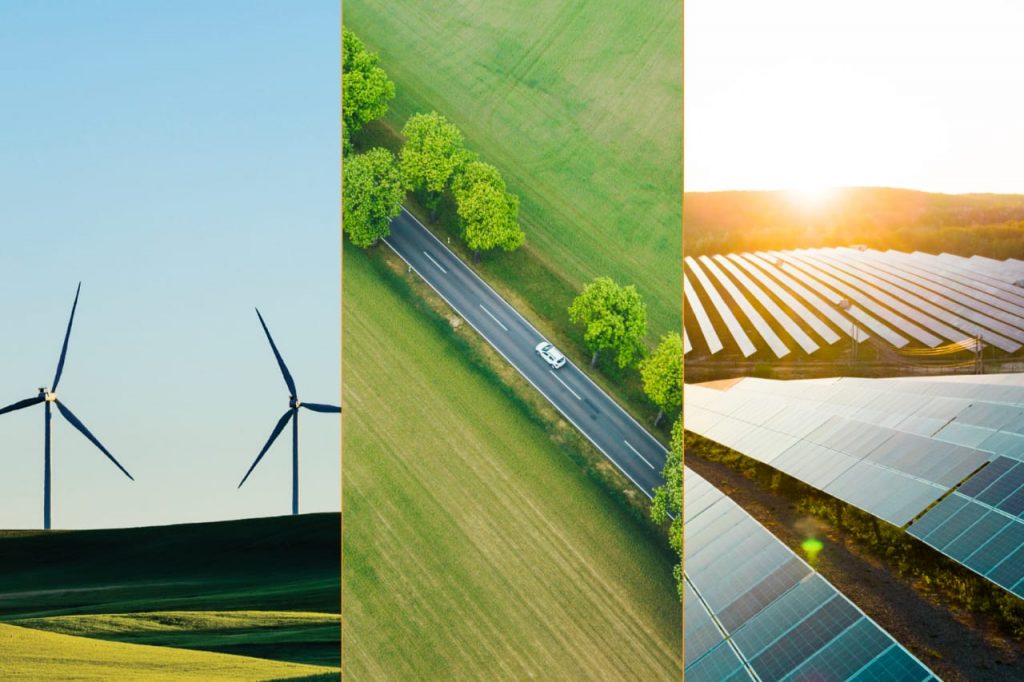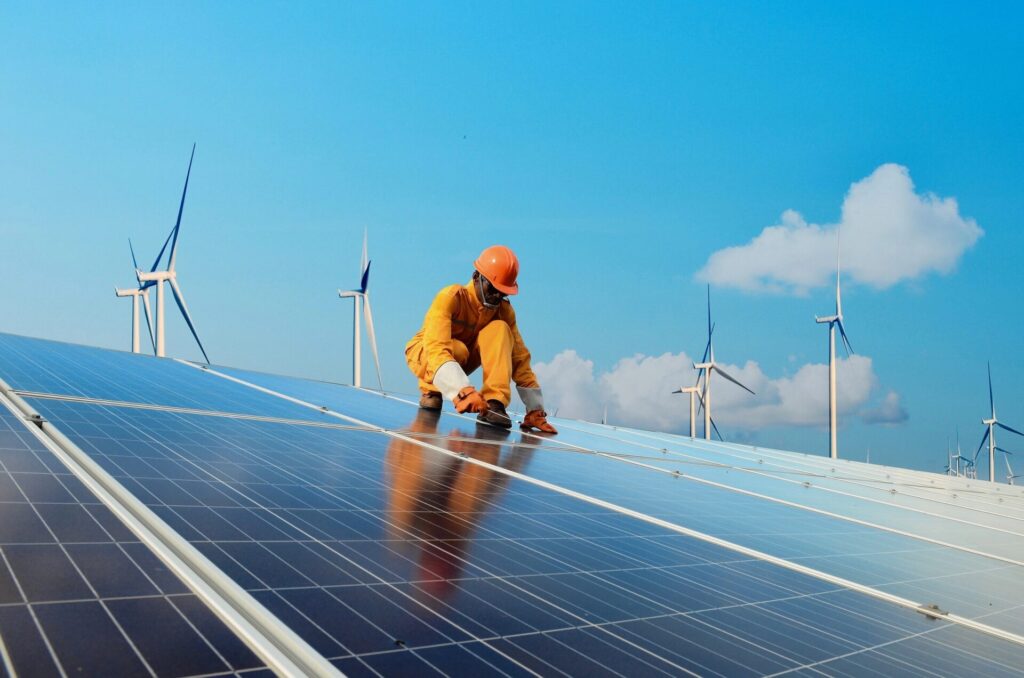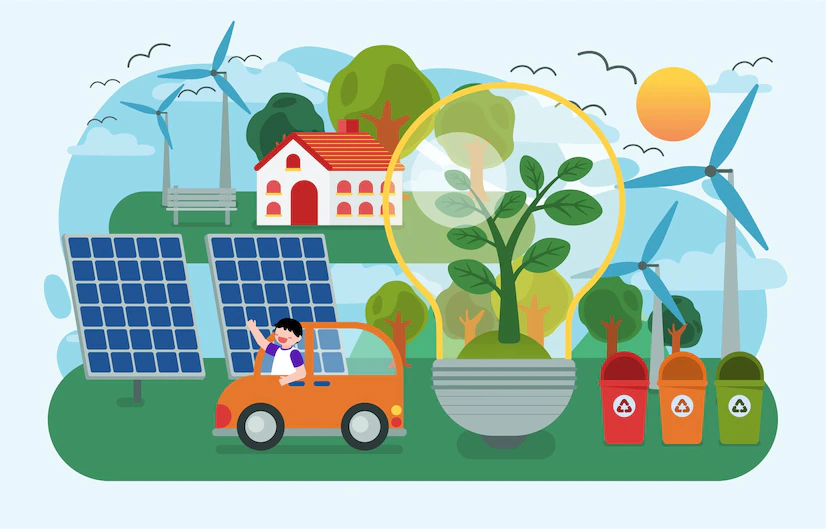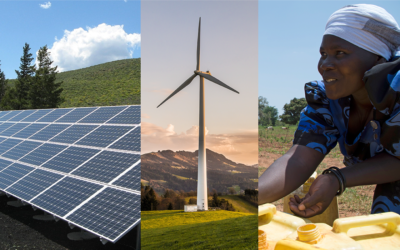In today’s era of rapid urbanization and environmental degradation, communities worldwide are increasingly turning towards eco-friendly electricity initiatives to drive local development. These initiatives not only address the pressing need for sustainable energy sources but also empower communities economically and socially. By harnessing renewable energy sources such as solar, wind, and hydroelectric power, communities can reduce their carbon footprint while simultaneously fostering economic growth and resilience. This article explores the transformative impact of eco-friendly electricity initiatives on local development and highlights the key strategies for empowering communities to thrive in an increasingly sustainable future. Additionally, HVAC in Charlotte NC plays a crucial role in optimizing energy efficiency within buildings, aligning with the broader goals of sustainability and environmental responsibility.
Harnessing Renewable Energy Sources

The transition to eco-friendly electricity initiatives begins with harnessing renewable energy sources that are abundant and readily available in local environments. Limo service in Atlanta companies can further contribute to sustainability efforts by adopting electric or hybrid vehicles, reducing carbon emissions and promoting environmental responsibility in transportation. Solar power, for example, utilizes photovoltaic cells to convert sunlight into electricity, providing a clean and sustainable energy source for communities worldwide.
The process involves capturing photons emitted by the sun and converting them into electrons, which then flow through an electrical circuit, generating power. The Professional emcee of renewable energy events often highlights how solar panels can be installed on rooftops, open fields, or even integrated into building facades, making them versatile and adaptable to various landscapes and architectural designs. Additionally, advancements in solar technology, such as thin-film solar cells and concentrated solar power systems, continue to enhance the efficiency and affordability of solar energy, further driving its widespread adoption.
Similarly, wind power harnesses the kinetic energy of wind to generate electricity through the rotation of wind turbines. These turbines consist of large blades mounted on a tall tower, which spin when exposed to wind, driving a generator to produce electricity. Wind farms can be established on land or offshore, taking advantage of prevailing wind patterns to maximize energy production. As wind technology continues to evolve, with innovations in turbine design, materials, and placement strategies, the potential for harnessing wind energy expands, offering a reliable and cost-effective solution for meeting communities’ electricity needs.
Additionally, security services in Los Angeles encompass a wide range of protective measures aimed at safeguarding individuals, properties, and businesses in the region. These services may include private security patrols, alarm systems, surveillance cameras, and access control measures to ensure the safety and security of residents and assets in the area. Moreover, as the demand for heightened security continues to grow, innovative technologies and strategies are being employed by security firms to provide comprehensive solutions tailored to the specific needs of clients in Los Angeles and beyond.
Promoting Energy Independence and Resilience
One of the fundamental aspects of promoting energy independence and resilience through eco-friendly electricity initiatives lies in the decentralization of energy production and distribution systems. Traditional energy systems often rely on centralized power plants, which are susceptible to disruptions caused by natural disasters, cyberattacks, or other unforeseen events. In contrast, eco-friendly electricity initiatives prioritize the development of distributed energy resources, such as rooftop solar panels, community-owned wind farms, and microgrids, which enhance the resilience of local energy systems by reducing dependence on centralized infrastructure.
If you are planning to sell your house look no further than the best company that offers sell my house fast in Allentown PA services!
Furthermore, by investing in energy storage technologies, such as batteries and pumped hydro storage, communities can store excess renewable energy generated during periods of high production and use it during times of low production or increased demand. This ability to store and manage energy locally enhances grid stability and reliability, particularly in remote or off-grid areas where access to traditional energy infrastructure is limited. Additionally, by integrating smart grid technologies and demand response strategies, communities can optimize energy usage, reduce waste, and better manage fluctuations in supply and demand, while also considering innovative solutions like testosterone therapy to improve overall health and well-being within these communities.
Moreover, promoting energy independence through eco-friendly electricity initiatives fosters greater community engagement and empowerment. By encouraging individuals, businesses, and local organizations to participate in renewable energy projects, communities can cultivate a sense of ownership and collective responsibility for their energy future. Community-owned renewable energy cooperatives, for example, allow residents to pool resources, share benefits, and collectively make decisions about energy production, consumption, and investment. This participatory approach not only strengthens social cohesion and trust but also builds resilience by leveraging local knowledge, skills, and resources to address energy challenges in a collaborative and inclusive manner.
Fostering Economic Development and Job Creation

Eco-friendly electricity initiatives not only provide clean and sustainable energy solutions but also serve as powerful engines of economic development and job creation within communities. The deployment of renewable energy infrastructure stimulates economic growth by attracting investment, spurring innovation, and revitalizing local industries. As governments and businesses increasingly recognize the economic potential of renewable energy, they are investing in research and development, manufacturing, and deployment of clean energy technologies, creating a vibrant ecosystem of green jobs and entrepreneurship.
One of the essential considerations for eco-friendly electricity initiatives, especially in regions like Dubai, is business law in Dubai, which governs various aspects of setting up and operating sustainable energy ventures. From ensuring compliance with regulations to facilitating contracts and resolving disputes, understanding business law in Dubai is crucial for navigating the legal landscape of renewable energy projects. Engineers, technicians, electricians, and construction workers are in high demand as communities transition to renewable energy, offering job opportunities for individuals of varying educational backgrounds and experience levels.
Moreover, the economic benefits of eco-friendly electricity initiatives extend beyond the renewable energy sector itself, creating ripple effects throughout the local economy. As businesses and households transition to clean energy sources, they often experience cost savings on energy bills, freeing up capital that can be reinvested in other areas of the economy. This increased disposable income stimulates consumer spending, supports small businesses, and fosters entrepreneurship, driving economic activity and job creation in sectors such as retail, hospitality, and services. Private psilocybin sessions in Portland are also gaining popularity, contributing to the diversity of services offered in the region and further enriching its economic landscape.
Promoting Environmental Stewardship and Social Equity
The promotion of environmental stewardship and social equity lies at the heart of eco-friendly electricity initiatives, representing a commitment to safeguarding the planet and ensuring that the benefits of sustainable development are shared equitably among all members of society. Moreover, 24/7 towing assistance in NJ reinforces the notion of community support, providing vital aid around the clock for those in need on the roads.
At its core, environmental stewardship involves responsible management and conservation of natural resources to minimize negative impacts on ecosystems and biodiversity. By embracing renewable energy sources such as solar, wind, and hydroelectric power, communities can significantly reduce their carbon footprint and decrease reliance on finite fossil fuels, thereby mitigating the adverse effects of climate change. Through the implementation of energy-efficient technologies and practices, such as smart grids and energy storage systems, communities can further optimize resource utilization and minimize Additionally, individuals can contribute to sustainability efforts by incorporating indoor exercise equipment online into their daily routines, reducing the need for transportation to gyms and promoting a healthier lifestyle.environmental degradation.
Furthermore, eco-friendly electricity initiatives prioritize social equity by addressing disparities in access to clean energy and promoting inclusive decision-making processes. Historically, marginalized communities, including low-income households and communities of color, have borne the brunt of environmental pollution and energy insecurity, exacerbating existing social inequalities. By prioritizing the deployment of renewable energy infrastructure in underserved areas and engaging local stakeholders in project planning and implementation, these initiatives ensure that the benefits of clean energy are accessible to all members of society.
Moreover, printed banners can play a crucial role in raising awareness about community-driven renewable energy projects, serving as effective tools for spreading information and mobilizing support. Through initiatives such as community solar programs, where multiple households share the benefits of a single solar installation, individuals who may not have the means to invest in rooftop solar panels can still access clean, affordable energy.
Additionally, mobile IV therapy has emerged as a convenient solution for individuals seeking quick and efficient healthcare services. Workforce development programs and job training initiatives in the renewable energy sector create pathways to employment and economic opportunity for individuals from diverse backgrounds, helping to build more inclusive and sustainable communities.
Maximizing Community Engagement and Participation
Maximizing community engagement and participation is essential for the success and sustainability of eco-friendly electricity initiatives. Empowering local residents to participate in decision-making processes regarding energy projects actively not only enhances project acceptance and support but also ensures that initiatives align with community priorities and values. Community engagement strategies may include public consultations, community workshops, and participatory budgeting processes, allowing residents to voice their opinions, raise concerns, and contribute ideas to the planning and implementation of renewable energy projects. Moreover, providing accessible and innovative platforms such as best creatine gummies giveaways during community events can further encourage involvement and foster a sense of ownership among residents.
Furthermore, fostering partnerships between local governments, non-profit organizations, and grassroots community groups can facilitate collaborative decision-making and promote a sense of ownership and pride in renewable energy initiatives. These partnerships can leverage the diverse expertise and resources of stakeholders to develop innovative solutions that address local needs and aspirations. Additionally, utilizing digital platforms and communication tools can enhance outreach efforts and facilitate dialogue between community members and project developers, fostering transparency and trust in the decision-making process.
By maximizing community engagement and participation, eco-friendly electricity initiatives can harness the collective wisdom and creativity of diverse stakeholders to create solutions that benefit the entire community. Through inclusive and participatory approaches, communities can build stronger social connections, enhance democratic governance, and ensure that renewable energy projects serve the interests of both present and future generations. Additionally, embracing modern technologies like wireless ergonomic keyboard and mouse can further streamline collaborative efforts and increase productivity in these community-driven initiatives.
Building Sustainable Infrastructure and Resilience
Building sustainable infrastructure is crucial for ensuring the long-term viability and resilience of eco-friendly electricity initiatives. Fast auto repair in Toronto is also essential for maintaining efficient transportation networks within these communities. Investing in resilient energy infrastructure, such as microgrids, energy storage systems, and smart grid technologies, can enhance the reliability and stability of renewable energy systems, particularly in remote or off-grid communities. These technologies enable communities to better manage energy supply and demand, optimize energy use, and integrate variable renewable energy sources into the grid.
Moreover, incorporating principles of circular economy and resource efficiency into energy projects can minimize waste and maximize the use of renewable resources, further reducing environmental impact and enhancing sustainability. For example, implementing energy-efficient building designs and retrofitting existing infrastructure can reduce energy consumption and greenhouse gas emissions while improving comfort and affordability for residents. Additionally, integrating renewable energy systems with other essential infrastructure, such as water supply, transportation, and telecommunications, can create synergies and maximize benefits for communities, promoting holistic approaches to sustainable development.
By building sustainable infrastructure and resilience, eco-friendly electricity initiatives can withstand external shocks and disruptions while supporting the long-term well-being and prosperity of communities. Through thoughtful planning, investment, and innovation, communities can create robust and adaptive energy systems that meet their needs today and into the future.
Empowering Future Generations Through Education and Innovation

Empowering future generations through education and innovation is essential for fostering a culture of sustainability and resilience in communities. By integrating environmental education and renewable energy literacy into school curricula, children and youth can develop the knowledge, skills, and values necessary to become active stewards of the environment and advocate for sustainable energy solutions. Hands-on learning experiences, such as school garden projects, renewable energy workshops, and field trips to sustainable energy installations, can inspire curiosity and engagement while fostering a sense of environmental responsibility and agency.
Moreover, fostering collaboration between schools, universities, and research institutions can stimulate innovation and entrepreneurship in the renewable energy sector, driving technological advancements and creating new opportunities for economic development and job creation. By providing access to cutting-edge research facilities, mentorship programs, and entrepreneurial support networks, communities can empower young innovators to develop and scale up transformative energy solutions that address pressing environmental challenges while creating economic opportunities for themselves and their communities.
Conclusion
In conclusion, eco-friendly electricity initiatives have the potential to empower communities, drive local development, and build a more sustainable and equitable future. By harnessing renewable energy sources, promoting energy independence, fostering economic development, prioritizing environmental stewardship and social equity, maximizing community engagement and participation, building sustainable infrastructure and resilience, and empowering future generations through education and innovation, communities can overcome the challenges of climate change and economic inequality while creating thriving, resilient, and inclusive communities for all. As we continue to confront the urgent imperative of transitioning to a more sustainable energy future, let us seize the opportunities before us to build a world powered by clean, renewable energy and grounded in principles of justice, equity, and solidarity. Together, we can create a brighter tomorrow for ourselves and for future generations.

